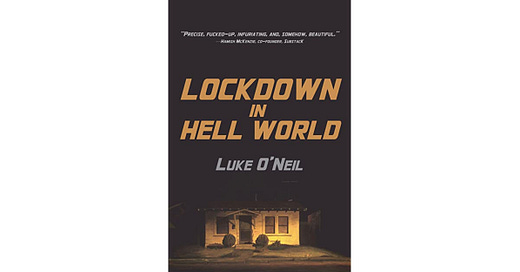Talking to Luke O'Neil About Lockdown In Hell World
The writer tells us about making it through the pandemic and his new book.
It’s March 1, and while we can quibble over the exact date that the world actually came to a halt I think for most of us effectively it has been a full year that we have been stuck in our silly little rooms and wearing our silly little masks and trying not to get the silly little disease that has killed 500,000 people in this country. I moved into a new apartment 11 months ago, on April 1, when the pandemic was in full swing, and since then have been sitting in the same chair looking at the same computer screen seemingly nonstop. It has done strange things to my brain.
Today I’m talking with Luke O’Neil, who has captured this hopelessness and isolation better than any writer I’ve read this far in his new book LOCKDOWN IN HELL WORLD, which roots those feelings in the specific circumstances that created them and goes out its way to talk to people who have it worse than we do, in the hope that none of us get confused about how we got here and who’s responsible. You can also subscribe to Luke's newsletter, Welcome to Hell World, and follow him on Twitter.
This interview has been edited and condensed for clarity.
You have this particular style of writing that does a really effective job of conveying the relentless, hopeless nature of what people are feeling. It just doesn’t let up. For me, it can be cathartic to read, but it can also be difficult to read sometimes. How did you find yourself honing into that style?
This won’t come as a surprise to anybody but I spend a lot of time looking at Twitter. And it’s a relentless onslaught of: there was a bombing somewhere, there was a shooting, oh, the Celtics are doing ok -- that's cool. Oh, there's a sexual harassment thing, oh, somebody just told a dick joke on my Twitter. When you're consuming all of that at once, there’s a whiplash sort of effect. Trying to process all of that information at once has sort of made us all a bit weird. The original idea of the newsletter was to try to put that feeling into words.
I’ve been doing this for like 20 years -- freelancing and stuff, writing for serious newspapers and magazines. But you’re not allowed to like, step aside in the middle of your Boston Globe article to say like: “What the fuck is this, this is fucking weird. This reminds me of the time when I was at Boy Scout camp and I shit my pants or something, or whatever it is.”
But this is how people are thinking when they’re reading things. When you read an article, your brain doesn’t turn off, you’re thinking about things in your own life, so I just figured when I’m reporting something, whatever I start to think of I’m going to do it as an aside in this piece. I feel sick and angry all the time when I'm reading anything. And I wanted to really, uh, try to make other people feel sick and angry too in the same way that I do.
Keep reading with a 7-day free trial
Subscribe to Discourse Blog to keep reading this post and get 7 days of free access to the full post archives.





